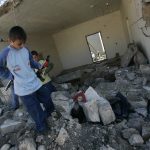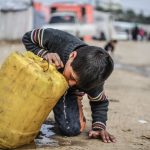UNICEF called on the world not to turn a blind eye to the tragedy of Sudanese children, which has now become the largest child displacement crisis in the world, three hundred days after the war that broke out in April last year, and caused a wave of atrocities against Sudanese children.
UNICEF spokesman James Elder spoke to reporters in Geneva on Friday, following a recent visit to Chad and Darfur during which he met with refugee and displaced families.
Elder reported that four million Sudanese children have been displaced – that is, 13,000 children every day for 300 days, noting that hope has faded, people have lost safety and property, while friends and family members have been separated from each other or gone missing.
The most dangerous type of malnutrition
James Elder pointed out that more than 700,000 children are likely to suffer from the most serious forms of malnutrition this year. “We will not be able to treat more than 300,000 of them without improved access and additional support. Tens of thousands will likely die.”
He also pointed out that cases of murder, sexual violence, and recruitment have increased five-fold compared to a year ago. “This equates to horrific numbers of children who have been killed, raped or recruited. These numbers are just the tip of the iceberg.”
A war destroys a country and the future of an entire generation
A UNICEF spokesman says that two-thirds of the population currently lacks health care. He added:
This is a war that destroys health and nutrition” systems, and kills people. This is a war that destroys the concept of respecting the laws of war, which is killing people. It is a war that destroys families’ ability to feed and protect themselves. It is a war that destroys opportunities, destroys a country and the future of an entire generation.”
James Elder warned that the true cost of the war is not measured only by the number of victims, but also by the loss of intellectual capital, “and this war risks dooming Sudan to a future devoid of learning, innovation, progress, and hope.”







